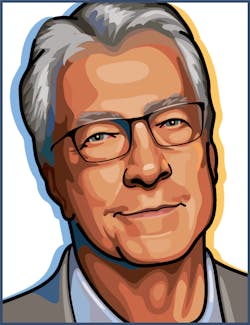Business Forum: Quantum computing: What’s in it for photonics companies?

Enthusiasm and resources for quantum technologies are clearly gaining global momentum (along with some hype). I think these are the signs of a new area of growth for photonics, even if the actual course of development varies widely from initial ambitions and extends over decades.
The core applications for quantum technologies are usually said to be metrology, communications, and computing. While quantum sensing may offer the earliest technology return on investment, quantum computing strikes me as offering the most promising long-term opportunities for photonics.
In Europe, the EU has begun its 10-year, 1-billion-euro Quantum Flagship project for a community of quantum technology-related companies and research groups, and there are very substantial national efforts in Canada, Germany, the UK, The Netherlands, and elsewhere. The Chinese government plans to invest a reported $10 billion to build the world’s largest quantum information science research facility in Hefei.
The U.S. government, now convinced of the importance to national security and economic growth, is taking steps to fund greater support through the National Quantum Initiative Act, which was approved by the House of Representatives in mid-September 2018—a Senate version is in the works at the time of this writing. Barring delays related to the mid-term elections, final approval seems likely and would provide $1.275 billion in funding for five years to accelerate research, coordination, and commercialization of federal research by the private sector. Related funding is set to establish or expand the National Science Foundation and U.S Department of Defense quantum research efforts as well.
In September, the White House Office of Science and Technology Policy (OSTP) released its strategic overview of quantum information science, which lays out a science-first approach and identifies four strategic challenges: coordination among government and public and private institutions, workforce development, cross-community connections between disciplines, and, especially interesting to me, maintaining a culture of discovery “despite countervailing pressures.” This is critical because, “The likely best-use commercial cases of quantum devices are unknown at this time and must be found through research [emphasis by OSTP].”
To establish dominance in quantum computing specifically, public corporations such as IBM, Intel, and Google in the U.S., and Alibaba and Baidu in China are investing great resources. Likewise, there are dozens of small companies aiming to compete in varying aspects of the emerging quantum computer market. QuantumComputingReport.com, a website that tracks the industry, lists 20 publicly traded companies, 76 startups, and 90 venture capital funds that claim to be involved in quantum computing. I know of several more startups that are not listed.
So, an ecosystem is beginning to emerge. It encompasses makers of hardware and software, and developers of algorithms and applications, along with a workforce, investors, and recognition of steps that are needed to continue growing, including advocacy. For quantum technologies in the U.S., much of this work has been done by the National Photonics Initiative. Another group is the Quantum Industry Coalition, which includes D-Wave Systems, Founders Fund, Intel, Lockheed Martin, Microsoft, Rigetti Computing, and Strangeworks.
Many makers of photonics components and systems have lasers, optics, and detectors that could support some of the ways to build a quantum computer. At the 2019 Lasers & Photonics Marketplace Seminar, to take place February 4th during SPIE Photonics West, John Dexheimer of LightWave Advisors will lead a panel exploring the question of how quantum computing may present a long-term growth opportunity for photonics. Participants will include quantum instrument maker ColdQuanta and quantum computer maker IonQ. It’s a start toward understanding the ecosystem.
About the Author

Conard Holton
Conard Holton has 25 years of science and technology editing and writing experience. He was formerly a staff member and consultant for government agencies such as the New York State Energy Research and Development Authority and the International Atomic Energy Agency, and engineering companies such as Bechtel. He joined Laser Focus World in 1997 as senior editor, becoming editor in chief of WDM Solutions, which he founded in 1999. In 2003 he joined Vision Systems Design as editor in chief, while continuing as contributing editor at Laser Focus World. Conard became editor in chief of Laser Focus World in August 2011, a role in which he served through August 2018. He then served as Editor at Large for Laser Focus World and Co-Chair of the Lasers & Photonics Marketplace Seminar from August 2018 through January 2022. He received his B.A. from the University of Pennsylvania, with additional studies at the Colorado School of Mines and Medill School of Journalism at Northwestern University.